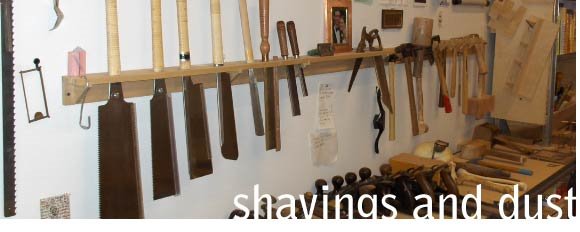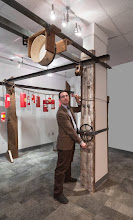Suffice it to say that she welcomed me and (along with the other drama club folks) nurtured me and brought me along. Eventually I started volunteering at the local community theater (beginning a relationship that lasted until I finally got out of the entertainment biz entirely almost twenty years later), where I was taken under the wing of the technical staff and trained in what would later become my vocation. This training was not, at first, a classroom training, but rather an apprenticeship of sorts. We worked in the shop two nights a week, and when we got closer to show time we worked more and more until we were basically there whenever we were not at work or at school. Then the show would come down and we would start the process all over again.
It was a magic time.
My jobs within that community started out as menial jobs, and as I learned more by watching and by doing and by being shepherded by very patient people I was given increasingly complicated tasks. These culminated in being in charge of whole groups of people and large projects by the time I was a senior. A senior in high school. I had apprenticed and learned on the job management skills, carpentry, electrician work, plumbing, upholstery, painting, rigging, all manner of jobs. I had learned these skills by doing, by using my hands alongside the hands of people who had been doing this since before I was born, by watching as much as by being told.
I went on to college, first at a state university and then at the recently re-named University of North Carolina School of the Arts (many of my peers are as unimpressed by the name change as I am, but there it is. Times change). At these schools I honed my skills, learning the "why" behind the "what." I grew up a little, I learned a little more respect (not enough, but it is a slow process for a 20 year old boy). Then on to New York to work in the field; cocky like a lot of young people, narrow minded like a lot of young people, self-absorbed like a lot of young people. Though it would be some years before I started to hone in on what was missing (a socially active component, and ecologically sound component), a lot of how I move through the world was already in place: a desire to work and work a lot, a need to use my hands, a passion for working with a group of people, the inability to sit in an office alone.
This all came to a head yesterday morning when I came in to the shop. A colleague had asked me to make something for him. A small project, very easy for me, just not as possible for him as he has a different skill set and does not have the equipment that we do. So first thing in the morning I started in on this little job. It was only after I was done an hour later that I realised that I had just reaped the benefits of my theater education: I had worked quickly but precisely, thinking on the fly and planning as I went - not in a haphazard way, in a very considered way but also very rapidly - I had moved material through the shop and executed the project at as high a level of craft as I could (which is certainly good enough for this project) and had, in an hour, finished and could move on to the next project.
This was only possible because of my theater training, and it was very satisfying. It made me grateful for my early apprenticeship and for my later formal education, for my journeyman phase in the City, for all of the teachers and mentors along the way. So I started to make a list of what I learned in the late eighties and early nineties in the course of all of this, the beginning of which is below. This is an incomplete list, but pretty impressive:
Manual Skills: carpentry, welding/brazing/soldering, upholstery, plumbing, electrics, tile work, furniture construction, painting, faux finishes, stitching, patterning, embroidery, rigging, leather work
Managerial skills: group dynamics, time management, interpersonal communication, budgeting (okay, I don't use this a lot, but I know how to do it if forced as I have been over the years occasionally), adherence to a deadline.
Life Skills: basic physics, basic geometry, problem solving, teaching, work ethic, finding joy and pride in my craft, respect for others, respect for and a love of history
There is more to the list, but that is a good start. This post has turned self-congratulatory, which is a little grating to read, I know. But this is meant to be less about me personally and more about the education itself. There is a lot wrong with the entertainment industry, as there is with just about every industry, but the education has a lot about it that is right, too. I have a zero desire to return to that field, but if either of my sons said to me that they wanted to pursue a theatrical education I would encourage that completely. And as they grow and develop, I think it will be important to me that making and using their hands constantly will continue to be central to their learning.
There is a bit of misdirection involved in this kind of education. The focus is often on completing the task at hand, the skills that are being learned may not be acknowledged or even obvious. But the deeper learning that comes from, for example, using a saw to cut twenty platform legs all to the same length does not leave one, even decades later. I am very fortunate for the education I have received. I am fortunate that I had the legions of caring and dedicated and patient teachers. And I am profoundly thankful for all of it.


3 comments:
Indeed. When people discover that I have a degree in theatre (completely unrelated to my current amazing career), they ask "what did you study? What kind of skills did you learn?" I respond "oh, only every basic skill needed to live and interact with others successfully." Thank god for theater and all its vices.
Your expereinces have made you who you are, someone to be pround of, don't ever forget.
O Zeke! So well said! I have many friends who also studied and crafted in the theater only to leave the business behind. But not very far. I believe that is the beauty of the business. We learn more about the business of life as we learn a craft.
Post a Comment